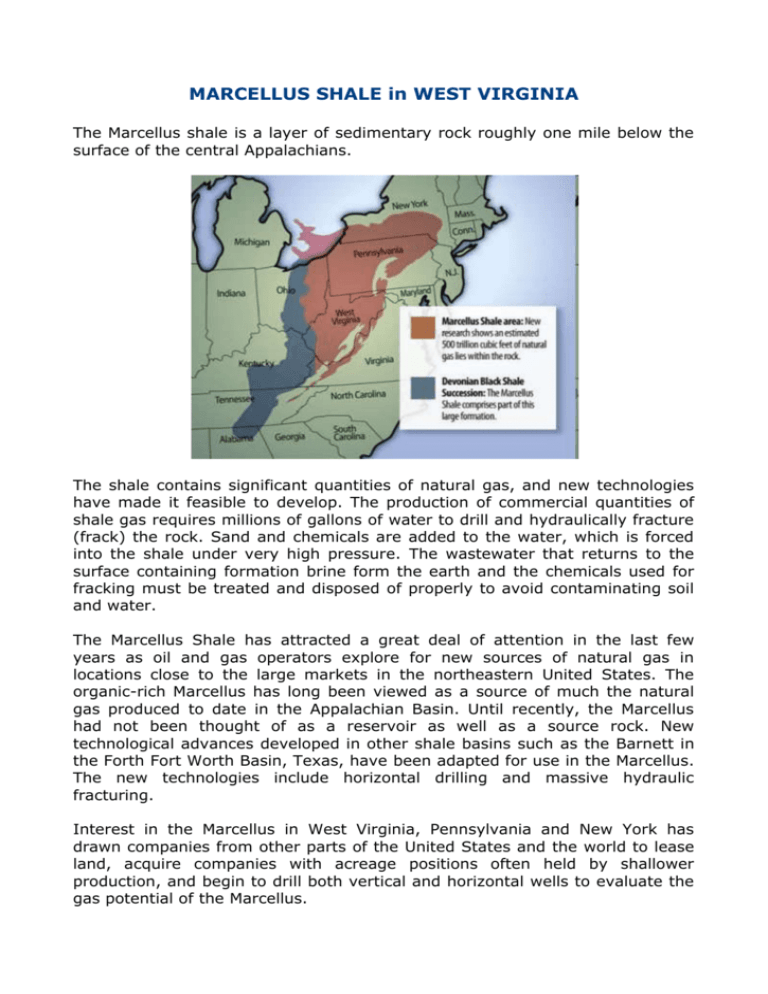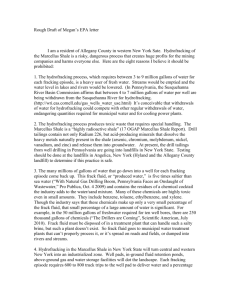
MARCELLUS SHALE in WEST VIRGINIA
The Marcellus shale is a layer of sedimentary rock roughly one mile below the
surface of the central Appalachians.
The shale contains significant quantities of natural gas, and new technologies
have made it feasible to develop. The production of commercial quantities of
shale gas requires millions of gallons of water to drill and hydraulically fracture
(frack) the rock. Sand and chemicals are added to the water, which is forced
into the shale under very high pressure. The wastewater that returns to the
surface containing formation brine form the earth and the chemicals used for
fracking must be treated and disposed of properly to avoid contaminating soil
and water.
The Marcellus Shale has attracted a great deal of attention in the last few
years as oil and gas operators explore for new sources of natural gas in
locations close to the large markets in the northeastern United States. The
organic-rich Marcellus has long been viewed as a source of much the natural
gas produced to date in the Appalachian Basin. Until recently, the Marcellus
had not been thought of as a reservoir as well as a source rock. New
technological advances developed in other shale basins such as the Barnett in
the Forth Fort Worth Basin, Texas, have been adapted for use in the Marcellus.
The new technologies include horizontal drilling and massive hydraulic
fracturing.
Interest in the Marcellus in West Virginia, Pennsylvania and New York has
drawn companies from other parts of the United States and the world to lease
land, acquire companies with acreage positions often held by shallower
production, and begin to drill both vertical and horizontal wells to evaluate the
gas potential of the Marcellus.
Here is a map showing the Marcellus wells in West Virginia:
As you can see from the above shown map, the wells are endless in numbers
and therefore there is a great need of companies who can service this industry.
There are several companies already investing in fractionators and crackers.
For an industry perspective, see the Marcellus Shale Coalition at
http://marcelluscoalition.org/?iframe=true&width=85%&height=85%.
Below there are articles related to the companies who announced projects in
West Virginia (Gastar Exploration & Fluids Management of AES Drilling Fluids
LLC) and expansion (Caiman Energy) due to the Marcellus Shale.
The website of Just Beneath The Surface (www.justbeneaththesurfacewv.com)
gives you the facts about the natural gas industry in West Virginia, containing
the latest in natural gas news and providing factual information and two-way
communication on the subjects of economic benefits, environmental standards
and regulations, safety and the future of energy in West Virginia.
C om p a ny P l an n i ng t o S p e n d $20 0 M i l l i o n i n
M ar sh al l C o un t y
November 30, 2011
By CASEY JUNKINS - Staff Writer , The Intelligencer / Wheeling News-Register
GRAYSVILLE - Gastar Exploration plans to invest about $200 million in West
Virginia's Marcellus Shale field in 2012, with virtually all of the money directed
to Marshall County.
With five producing natural gas wells in the area - and plans for more over the
next several years - officials with the Houston, Texas-based driller are working
to establish good public relations with Marshall County leaders and residents.
This includes spending about $2.5 million to repave Rines Ridge and Burch
Ridge, both of which suffered damage from heavy equipment traveling to
Gastar drilling sites.
"We want people to know who we are, and we want to hear their concerns,"
Gastar Vice President-Northeast Michael McCown said during a break at the
company's Tuesday open house event at the Graysville Community Center.
Photo by Casey Junkins
Gastar Exploration Vice President-Northeast Michael McCown, right, shows Marshall County
Commissioner Brian Schambach a piece of Marcellus Shale during an open house in
Graysville.
About 100 interested residents, state and local officials and gas industry
employees participated in the open house.
In addition to repairing Rines Ridge and Burch Ridge, McCown said Gastar is
going to spend an additional $2.5 million to refurbish an old state road that is
not currently in use. This road, which he said would be exclusively for drilling
truck traffic, would connect W.Va. 2 to Waynes Ridge, relieving much of the
truck traffic from the other two roads.
"The terrain is a significant challenge for drilling here in West Virginia,"
McCown admitted. "We need to take advantage of as much flat ground as
possible."
Fact Box
Gastar Exploration
- In 2010, had total revenue of $42.76 million.
- A Canadian company incorporated in Alberta in 1987.
- Gastar is publicly traded on the NYSE Amex under the ticker symbol GST.
McCown said the Marcellus Shale play in northern West Virginia is one of the
more exciting ventures of his 35-year career.
"The liquids-rich Marcellus is here," he said in reference to gas that contains
ethane, propane, butane and pentane, in addition to the methane natural gas.
"That makes the operations here more valuable."
With about 79,000 acres leased in West Virginia, McCown said the company
will drill about 20 Marcellus wells on the acreage this year. As leasing deals
continue - including some that are made from the company's local leasing
office on Warden Run Road near Oglebay Park - Gastar plans to drill about 25
wells in the area next year.
Eighty percent of the company's capital investments next year, McCown said,
will come in West Virginia, with almost all of this in Marshall County.
"All of our gas goes to Caiman" Energy, McCown said of the company that
operates the ever-expanding processing plant along U.S. 250 near Cameron.
Once the gas goes to Caiman, the natural gas liquids - ethane, propane,
butane and pentane - are separated from the methane natural gas, so that
the products can be sent to market.
Marshall County Commission President Jason "Jake" Padlow is excited about
the investments from Gastar, Caiman and other natural gas companies especially when the companies repair the roads they damage.
"It is good to have them at an event like this, taking a proactive approach
with the community," he said of the driller. "They are working to repair the
roads they are damaging."
In speaking of all gas companies working in Marshall County in general,
Padlow added, "They are here, so let's work together."
McCown said any residents with questions or concerns about Gastar's
operations should call the Clarksburg, W.Va. office at 304-622-4796.
© Copyright 2012 The Intelligencer / Wheeling News-Register. All rights reserved. This
material may not be published, broadcast, rewritten or redistributed.
D ri l l i ng F l ui d P l a nt C om i ng t o Be nw o od
November 30, 2011
By SCOTT McCLOSKEY - Staff Writer , The Intelligencer / Wheeling News-Register
BENWOOD - A new, $2 million "drilling mud" facility has located in Benwood,
bringing further hope of an economic rebirth to the small city.
The Intelligencer has learned that Fluids Management, a Division of AES
Drilling Fluids LLC of Houston, Texas, plans to open the multi-million-dollar
plant in Benwood's Industrial Park before February. More than a dozen large
steel containers that will hold the drilling fluids currently are located on a
concrete pad several feet thick as construction of the plant continues.
Fluids Management will serve as a drilling fluid vendor for the region's
burgeoning natural gas drilling industry. Drilling fluid, also called drilling mud,
is used to aid in the drilling of boreholes into the Marcellus and Utica shales.
Photo by Scott McCloskey
Fluids Management, a Division of AES Drilling Fluids LLC of Houston, Texas, which serves as a
vendor for the region’s growing gas drilling industry, is set to open a new facility at the
Benwood Industrial Park by February.
The new facility, which is initially expected to create between 12 to15 full-time
jobs for local residents, makes a synthetic oil-based drilling fluid called ABS-40
that is used in the drilling process, said Russell Marks, operations manager for
Fluids Management.
"We basically rent the fluid to the customer ... whether it's Chevron,
Chesapeake or whomever, and they use it to drill the well," Marks said. After
the hole is bored, Marks said the drilling fluid is returned to the plant, where it
will be "reconditioned" and used again.
"The drilling fluid helps you removes the cuttings from the well ... and (it also
helps) run casings and complete the well," Marks said.
He did point out that Fluids Management has nothing to do with the hydraulic
fracturing process used to extract the natural gas.
The new facility, located along the Ohio River, sits on a 180 foot by 120 foot
concrete pad and is located just south of Automatic Recycling.
When complete, it will hold about 20 large tanks that provide nearly 9,000
barrels of drilling fluid storage.
Marks said the company also will have several tanks to store calcium chloride
water.
Locating in Benwood made sense for the company, he added.
"We can service our southwestern Pennsylvania customers, our West Virginia
customers and southeast Ohio customers ... the logistics (were) good for us,"
he said.
Fluids Management has a regional office in Canonsburg, Pa.
The five-year deal with Fluids Management also will work out well for
Benwood. City Economic Development Committee Co-Chair and Police Chief
Frank Longwell said he is hopeful the project, which was a joint venture
between the development committee and Mull Industries, is another step
toward what he called the "rebirth" of the city and also the CSX rail yard.
Longwell also said he believes the project will lead to more growth for the
industrial park.
"It's revenue and jobs ... that's why Benwood is doing well," Longwell said
while touring the new facility and surrounding property. The Marcellus Shale is
"like a rebirth of our industry here. We feel that we have the real estate and
transportation assets, which is a big thing."
"We're happy that all of this activity is going on ... It's definitely been a boost
to the CSX yard traffic, as two years ago the rail yard was vacant," he said.
Longwell said with new businesses such as Fluids Management transporting
freight and supplies into the industrial park, it's "breathing new life" into the
rail yard.
"We look for a lot of other things to happen," he said.
Mayor Ed Kuca said he is just happy about the creation of more local jobs in
Benwood that will provide good pay and benefits. "It's jobs you can actually
raise a family on ... and we're excited to see them come to Benwood."
© Copyright 2012 The Intelligencer / Wheeling News-Register. All rights reserved. This
material may not be published, broadcast, rewritten or redistributed.
Caiman Energy Expanding Presence in Marshall County
Company to spend $1.3 billion by 2014
January 20, 2012
By CASEY JUNKINS Staff Writer , The Intelligencer / Wheeling News-Register
CAMERON - A sure sign of increased local natural gas production is that
Caiman Energy plans to bring its total investment in Marshall County
processing infrastructure to $1.3 billion by the end of 2014.
In fact, the Dallas, Texas-based natural gas processing company - which
West Virginia Gov. Earl Ray Tomblin acknowledged for investing more than
$250 million in Marshall County during his "State of the State" speech - is
making plans for more gas processing and fractionating in the county.
The Fort Beeler cryogenic plant, near Cameron along U.S. 250 in Marshall
County, now processes about 120 million cubic feet of gas per day. Some of
this gas flows to the site by a pipeline from Trans Energy's nearby drilling
sites, with more gas flowing to the site from Gastar Exploration and other
drilling operations.
By expanding its Fort Beeler cryogenic natural gas processing plant near
Cameron — and building plants at the Fort Wetzel site and former Olin
Chemical site — Caiman Energy is making more investments in Marshall
County.
By March 1, an additional 200 million cubic feet per day of processing
capacity is expected to be online at Fort Beeler. The facility should be able
to process 200 million more cubic feet each day by Aug. 1, bringing the
total capacity to 520 million cubic feet per day.
Basically, a company like Caiman - along with Dominion Resources and
MarkWest Liberty - is known in the industry as a processor, or
"midstreamer." This is because the processing company accepts the "wet"
Marcellus and Utica shale gas that drillers like Trans Energy, Gastar,
Chesapeake Energy or CNX Gas Corp. draw out of the ground. This gas
contains ethane, propane, butane, pentane and other substances, in
addition to the methane natural gas.
At processing plants, midstreamers separate the methane from the other
substances so that the methane can be sold by utility companies, such as
Mountaineer Gas or Columbia Gas. The ethane, propane, butane and
pentane - collectively known as natural gas liquids - are sent from the
processing facility to a fractionation facility, which will separate these
products from one another. The separated natural gas liquids are then
ready for use, with the ethane possibly going to a cracker plant.
As West Virginia and Ohio leaders await construction of at least one local
ethane cracker, Caiman plans to send ethane out of the Ohio Valley, as the
company is committed to send ethane to Canada for use by the Nova
Chemicals company at a cracker located there. Caiman will transport the
ethane to Sarnia, Ontario, via the Mariner West Project pipeline project
developed by Sunoco.
According to Caiman spokeswoman Casey Nikoloric, the company is
building another processing plant about 5 miles west of the Fort Beeler
facility that will be known as the "Fort Wetzel" cryogenic plant. This plant
should be able to process 200 million cubic feet of gas daily by April 1,
2013, with an additional 200 million cubic feet set for processing each day
by Oct. 1, 2013. This will bring Caiman's total processing capabilities in
Marshall County to 920 million cubic feet per day by the end of next year.
At the Caiman fractionation facility - under construction on the former Olin
Chemical site along the Ohio River, south of Moundsville - the company will
be able to separate 12,500 barrels daily by April 1, with total fractionation
capacity at the site expected to reach 42,500 barrels daily by Oct. 1.
"This is one of the most prolific regions in the country and the positive
economic impact continues to increase," Jack Lafield, chief executive officer
for Caiman, said recently regarding his company's Marshall County
operations.
© Copyright 2012 The Intelligencer / Wheeling News-Register. All rights reserved. This
material may not be published, broadcast, rewritten or redistributed.







